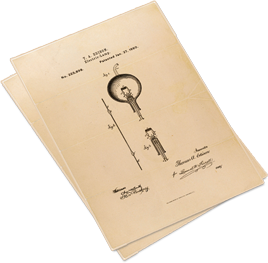The question comes up fairly often: Which should I use? The TM or the R-in-a-circle thing? Sometimes we raise the issue when we see our clients using the wrong one or none at all.
The difference between the two is straightforward and easy to understand. What often gets lost, however, is that there are consequences to not using one or the other and to using the wrong one.
The Simple Difference
® may be used in the United States only with a federally registered trademark or service mark (both “mark”) − that is, when you have a certificate of registration issued by the United States Patent and Trademark Office.1 When ® is not possible, the substitute is to include somewhere in the vicinity of the mark, often in a footer,a text notice to the effect, [mark] is a registered trademark of” you or your company.
TM is a KEEP OFF THE GRASS sign. (Properly, use SM with services.) TM is notice that you claim rights in a mark. If you are using the mark on goods or in connection with services you provide, you likely have some “common law” rights in the mark. If you have a registration issued by a U.S. state, you may have exclusive rights enforceable in that state. TM is appropriate in both of those instances.
Consequences
When you use something that can be a mark with goods or services that you trade in the market, you gain some rights in that mark even though it is unregistered. Those rights are limited and fragile, but they often can be enforced if you’ve given public notice of your claim of rights by using the TM or SM symbol. Without notice, any damages you may be able to recover will likely be minimal to none, and you may not even be able to stop the new user of your mark from continuing to use it.
If your mark is registered only in your state, although notice may not be required by your state, consistent and continuing use of the TM or SM symbol as public notice is still a good idea as use of the symbol should remove any question about whether a new user had proper notice.
Using the ® when your mark is not federally registered can be considered bad form on a scale from innocently misleading to maliciously fraudulent. Possible liability from a number of civil claims along that scale can put you in jeopardy, and in cases where the intent is to deceive or defraud, there may even be criminal liability.
Not using the ® (or its alternative) when your mark is federally registered limits or eliminates your ability to claim damages as a matter of law. Section 29 of the Trademark Act states that when a registrant fails “… to give such notice of registration, no profits and no damages shall be recovered under the provisions of this chapter unless the defendant had actual notice of the registration.” Of course one aim of suing to enforce your trademark rights is to stop someone from using a mark that infringes your rights and impacts your business, but litigation can be expensive, and the ability to claim sufficient monetary damages is important to offset that expense.
1.There are some exceptions regarding marks that are registered in other countries that are beyond the scope of this discussion.


